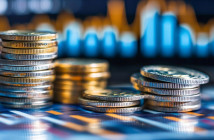The bad news on the U.S. economy is we’re seeing the highest levels of price inflation in 40 years or so. The silver lining is the economy is growing at a steady clip (7 percent on an annual basis in the last quarter of 2021) and unemployment is low (4 percent in January). As the U.S. Department of Labor boastfully but accurately put it in commentary on the January jobs report:
The new data shows that the economy added a record 6.6 million jobs since President Biden took office and an average of 541,000 new jobs per month over the last three months. With labor force participation up over the year and long-term unemployment continuing to decline, America is getting back to work.
So this poll finding from USA Today and Suffolk University is kind of … surprising: “a 51% majority of those surveyed say the economy is in a recession or a depression, the gloomiest outlook in six years.”
According to the Federal Reserve Bank of San Francisco, a recession is defined as “a significant decline in economic activity spread across the economy, lasting more than a few months, normally visible in real GDP, real income, employment, industrial production, and wholesale-retail sales.” All of those indicators are currently positive. A depression is defined as “a more severe version of a recession.” The Great Depression of the 1930s was a sustained period of economic stagnation, falling prices, and very high unemployment.
You don’t have to be a student of economics or follow economic indicators closely to understand that inflation and recession don’t usually coincide (except during the 1970s experience of “stagflation,” which is not happening at present). Most Americans can remember all the way back to May 2020, when the unemployment rate was 13.2 percent, more that triple what it is today. And today’s ubiquitous “Help Wanted” signs are not something you saw in 2020 — or, for that matter, in October 2009, when unemployment maxed out at 10 percent. You know, during the Great Recession.
It’s possible an awful lot of people think recession or depression just means economic trouble even if the problem at hand — inflation — is the opposite of, well, recession or depression. Or maybe, as The Atlantic’s Annie Lowrey suggests, something more fundamental is going on:
The economy is booming and people feel terrible. This strange situation is born of strong partisanship, complicated economic factors, changes in voter ideology, and the broader state of the world …
The gap between Democrats’ and Republicans’ consumer expectations rose from roughly 20 to 25 points during George W. Bush’s and Barack Obama’s presidencies to more than 50 points during the Donald Trump and Joe Biden years.
But it’s not just Republicans feeling bad about the economy, Lowrey notes:
The chaotic withdrawal from Afghanistan, the Delta and Omicron coronavirus waves, the sputtering of the Democrats’ election-reform and social-infrastructure bills, and, perhaps most of all, the false assurance that inflation would be “temporary” — all of those factors led Democrats and moderates to turn on Biden. “There’s no way for Biden, and Democrats generally, to offer a counternarrative that’s going to be as attractive as the bad news,” [Vanderbilt University political scientist John] Sides told me. “It’s been very hard for Democrats to feel optimistic.”
Americans may soon get a refresher course on what a real recession feels like if the Federal Reserve Board chooses to jack up interest rates to fight inflation, which is likely to slow down economic growth and boost unemployment. Maybe the Fed will get it just right and the economy will cool down without stalling out, or maybe the worst will happen and a deep recession will arrive.
Biden plans to address this economic malaise in Tuesday’s State of the Union Address, and reassuring the public about the economy as it exists today and what it might look like a few months down the road will be a tough task. If there was ever a time when Uncle Joe needed to project a calm and steady hand on the tiller, it’s now, whether it’s in dealing with the pandemic, a suddenly very dangerous world, or an economy that feels bad even in the ways it should feel good.



